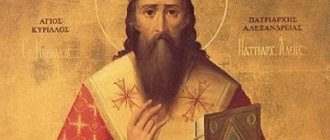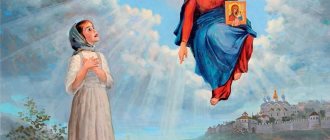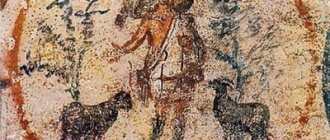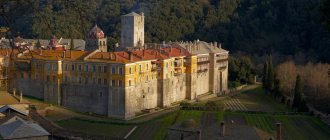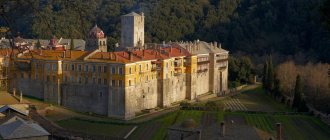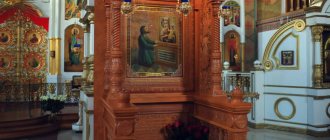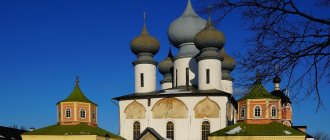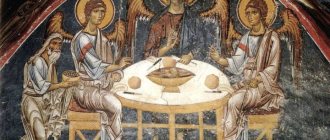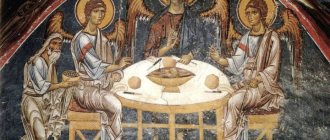| St. Kirill of Alexandria |
Cyril the Great
(+ 444), Archbishop of Alexandria, Father of the Church, Saint Commemorated on January 18 together with St. Athanasius of Alexandria and June 9
Nephew and successor (from 412) in the Alexandria department of the famous Theophilus, under his leadership he received an excellent education, both in theology and in secular sciences, especially in ancient literature, and completed his education in the society of the monks of the Nitrian desert.
In 403, being in the rank of deacon, together with Patr. Theophilus was present at the Council “at Oak”, which condemned John Chrysostom.
Cyril of Alexandria opened his episcopal activity with the persecution of Novatian heretics, who were expelled from his diocese, and Jews, who were partly expelled, partly beaten, with the confiscation of their property. This measure of St. Cyril aroused the displeasure of the Alexandrian prefect Orestes against him; monks of St. Kirill, for his part, responded with open insults to the prefect, and one of them even wounded him with a stone, for which he was executed. Cyril of Alexandria declared him a martyr for the truth and buried him with honor.
Until later, over St. Kirill was accused of inciting the parabolans to murder the famous Hypatia; it was refuted only in 1881, by the research of the Catholic scientist Koppalik.
When Bishop Atticus of Constantinople proposed to St. Kirill refused to include the name of Chrysostom in the church diptychs, but he refused, which is usually explained by his sincere conviction in the legality of Chrysostom’s overthrow. Only in 418 did he carry out Atticus’s proposal, thanks to the convictions of his friend Isidore Pelusiot, whose influence generally softened the harsh nature of the management of St. Kirill.
Since 419, the activities of Cyril of Alexandria were almost entirely devoted to the fight against the heresy of Nestorius; This was facilitated, by the way, by the long-standing antagonism of Alexandria against Antioch, to which Nestorius of Constantinople belonged by birth and way of thinking (Antiochian school), and Constantinople, to which, since the transfer of the imperial residence there, Alexandria had to give way to its place among the patriarchates. From time immemorial, the Alexandrian school was a defender of church teaching and in its theology did not go beyond its interpretation, while the Antiochian school was an organ of speculative and rationalistic theology. Despite the fact that Nestorius enjoyed the patronage of the emperor himself, that his side was supported by the Patriarchates of Antioch and (partly) Jerusalem and the freethinkers of the entire empire, the victory of St. Cyril was complete: in his writings he defended and formulated the “faith of the church” on a controversial issue, admittedly so completely and clearly that his teaching became the teaching of the entire Church.
| St. Kirill, Archbishop Alexandrian. Greek icon |
Having learned from the Egyptian monks that the sermons of Nestorius are circulating in the monasteries of his diocese, which prove that the Holy Virgin, as a person, could only give birth to a man, and gave birth not to God, but to Christ, and that therefore she should be called not the Mother of God, but the Mother of Christ
, St. Cyril wrote a letter to the hermits of Egypt, in which, without naming Nestorius by name, he briefly denounced his teaching, and when Nestorius was offended by this, Cyril directly demanded that he renounce these thoughts. Nestorius responded to this with a series of new heretical sermons. Then Cyril turned to Nestorius with a second letter, in which he explained church teaching in more detail. Nestorius responded by demanding Cyril, on behalf and with the consent of Emperor Theodosius, to appear before his court, regarding complaints against him by some Alexandrian clergy. Refusing to appear before the court of his personal enemy, Cyril agreed to submit to the verdict of the main bishops of the diocese or selected lay dignitaries, and at the same time sent three messages to the emperor and his sisters, in which he explained in detail the heresy of Nestorius. Theodosius's sister, Pulcheria, took Cyril's side, but the emperor was offended by the fact that in his letter to Pulcheria the Saint wrote about the matter in more detail and differently than he did, as if not recognizing him as capable of entering into a discussion of refined religious issues.
Relying on the support of Pope Celestine, St. Cyril convened a council in Alexandria, which approved the theses of his teaching that he formulated and uttered anathema to Nestorius (which is why these theses are known as the anathematisms of Cyril
). Nestorius responded to them with his anathematisms. Finally, the Constantinople clergy and Nestorius himself asked Emperor Theodosius to resolve the dispute at an ecumenical council.
In 431, Saint Cyril presided over the Third Ecumenical Council in Ephesus, at which the heresy of Nestorius was condemned. But the struggle continued after the council, with the emperor energetically supporting Nestorius. Saint Cyril returned to his diocese and ruled it for another 13 years after that. Died in 444
Prayers
| Svtt. Athanasius and Cyril of Alexandria. Russian icon, XIV century. (State Hermitage) |
Troparion, tone 8
Of Orthodoxy, teacher,/ piety to the teacher and purity,/ lamp of the universe,/ of the bishops, God-inspired fertilization,/ Cyril the Wise,/ with your teachings you have enlightened all,/ the priesthood of the spirits Naya, // pray to Christ God to save our souls.
Troparion of St. Athanasius and Cyril of Alexandria, tone 3
The deeds of Orthodoxy have shone, / extinguished all slander, / victorious, victorious, quickly, / enriched everything with piety, / adorned the Church with greatness, / worthy of the acquisition of Christ God, / / who bestowed on I have great mercy.
Kontakion, tone 6
The abyss of theological teachings/ you have poured out from the source of the Spasovs,/ plunging into heresy, Blessed Kirill,/ and saving the flock unharmed from troubles,/ for all countries, teacher and teacher bne, // like a Divine manifestation.
Kontakion of St. Athanasius and Cyril of Alexandria, tone 4
Priests of the greatest piety/ and virtuous champions of the Church of Christ,/ observe all, singing:/ save, Generous,// those who honor Thee with faith.
Saint Cyril of Alexandria
Cyril of Alexandria, the Great (+ 444), archbishop, father of the Church, saint. Memory January 18 (January 31), June 9 (June 22).
Nephew and successor (from 412) in the department of the famous Theophilus, under his leadership he received an excellent education, both in theology and in secular sciences, especially in ancient literature, and completed his education in the society of the monks of the Nitrian desert.
In 403, together with Theophilus, he was at the council in Constantinople, which condemned Chrysostom.
Cyril of Alexandria opened his episcopal activity with the persecution of Novatian heretics, who were expelled from his diocese, and Jews, who were partly expelled, partly beaten, with the confiscation of their property. This measure of St. Cyril aroused the displeasure of the Alexandrian prefect Orestes against him; monks of St. Kirill, for his part, responded with open insults to the prefect, and one of them even wounded him with a stone, for which he was executed. Cyril of Alexandria declared him a martyr for the truth and buried him with honor.
Until later, over St. Kirill was accused of inciting the parabolans to murder the famous Hypatia; it was refuted only in 1881, by the research of the Catholic scientist Koppalik.
When Bishop Atticus of Constantinople proposed to St. Kirill refused to include the name of Chrysostom in the church diptychs, but he refused, which is usually explained by his sincere conviction in the legality of Chrysostom’s overthrow. Only in 418 did he carry out Atticus’s proposal, thanks to the convictions of his friend Isidore Pelusiot, whose influence generally softened the harsh nature of the management of St. Kirill.
Since 419, the activities of Cyril of Alexandria were almost entirely devoted to the fight against the heresy of Nestorius; This was facilitated, by the way, by the long-standing antagonism of Alexandria against Antioch, to which Nestorius of Constantinople belonged by birth and way of thinking (Antiochian school), and Constantinople, to which, since the transfer of the imperial residence there, Alexandria had to give way to its place among the patriarchates. From time immemorial, the Alexandrian school was a defender of church teaching and in its theology did not go beyond its interpretation, while the Antiochian school was an organ of speculative and rationalistic theology. Despite the fact that Nestorius enjoyed the patronage of the emperor himself, that his side was supported by the Patriarchates of Antioch and (partly) Jerusalem and the freethinkers of the entire empire, the victory of St. Cyril was complete: in his writings he defended and formulated the “faith of the church” on a controversial issue, admittedly so completely and clearly that his teaching became the teaching of the entire Church.
Having learned from the Egyptian monks that the sermons of Nestorius are circulating in the monasteries of his diocese, which prove that the Holy Virgin, as a person, could only give birth to a man, and gave birth not to God, but to Christ, and that therefore she should be called not the Mother of God, but the Mother of Christ , St. Cyril wrote a letter to the hermits of Egypt, in which, without naming Nestorius by name, he briefly denounced his teaching, and when Nestorius was offended by this, Cyril directly demanded that he renounce these thoughts. Nestorius responded to this with a series of new heretical sermons. Then Cyril turned to Nestorius with a second letter, in which he explained church teaching in more detail. Nestorius responded by demanding Cyril, on behalf and with the consent of Emperor Theodosius, to appear before his court, regarding complaints against him by some Alexandrian clergy. Refusing to appear before the court of his personal enemy, Cyril agreed to submit to the verdict of the main bishops of the diocese or selected lay dignitaries, and at the same time sent three messages to the emperor and his sisters, in which he explained in detail the heresy of Nestorius. Theodosius's sister, Pulcheria, took Cyril's side, but the emperor was offended by the fact that in his letter to Pulcheria the Saint wrote about the matter in more detail and differently than he did, as if not recognizing him as capable of entering into a discussion of refined religious issues.
Relying on the support of Pope Celestine, St. Cyril convened a council in Alexandria, which approved the theses of his teaching that he formulated and uttered anathema to Nestorius (which is why these theses are known as the anathematisms of Cyril). Nestorius responded to them with his anathematisms. Finally, the Constantinople clergy and Nestorius himself asked Emperor Theodosius to resolve the dispute at an ecumenical council.
In 431, Saint Cyril presided over the Third Ecumenical Council in Ephesus, at which the heresy of Nestorius was condemned. But the struggle continued after the council, with the emperor energetically supporting Nestorius. Saint Cyril returned to his diocese and ruled it for another 13 years after that. Died in 444
Akathist to Saints Athanasius the Great and Cyril, Archbishops of Alexandria
Kontakion 1
In the election from the Heavenly Shepherd, our fathers, the blessed duo of Saints Athanasius and Cyril, the great city of Alexandria, the first throne, the enemies of the Church of Christ who were victorious with the weapon of the cross and prayer, with spiritual songs we praise you, our holy intercessors. You, as those who have boldness towards the Lord, pray for the Orthodox Church, for your city and all people calling with love: Rejoice, Saints Athanasius and Cyril, teachers of Orthodoxy, pillars of steadfastness and divine wisdom.
Ikos 1
Angels of earth and men of heaven appeared, Saints Athanasius and Cyril, ever illuminated by the light of true knowledge of God, as two luminaries enlightened nature by succession to each other on the patriarchal throne throughout the whole earth, and as the greatness of our hierarchs and teachers blocked the teaching of the evil heretics of nature, infusing the faithful with piety. In the same way, we, confirmed by the true faith of Christ, sing to you, defenders of the Orthodox Church: Rejoice, having rejected the charms of this world. Rejoice, vigilant guardians of a pure and immaculate life. Rejoice, having loved the One Christ with all your heart. Rejoice, having submitted your will to the will of God. Rejoice, you who have shown the image of true faith in yourself. Rejoice, having courageously taken upon yourself the yoke of Christ. Rejoice, divine wisdom has been fulfilled. Rejoice, vessels of the Holy Spirit of election. Rejoice, faithful workers of the grapes of Christ. Rejoice, decoration of the Orthodox Church. Rejoice, archpastors of the holy Church of Alexandria. Rejoice, eternal joys of the heiress. Rejoice, Saints Athanasius and Kirill, pillars of Orthodoxy, teachers of steadfastness and divine wisdom.
Kontakion 2
Seeing the Lord, the Knower of the Heart, your firm will, wisdom and piety, he appoints you, Father Athanasius, to the candlestick of the Church of Alexandria, so that the light of the Holy Gospel will shine in the countries of the East and, enlightened by you, people will sing a song of praise to God: Alleluia.
Ikos 2
Having obeyed the will of God with a bright mind and a pure heart, having taken the good yoke of Christ, in the footsteps of the apostles our fathers Athanasius and Cyril followed nature into spiritual fields, abundantly sowing the word of God, enlightening their flock with grace and confirming many in the true faith. In the same way, we, enlightened by your Godly teachings, cry out to you: Rejoice, blessed by God. Rejoice, having lived in true simplicity and silence. Rejoice, having dedicated yourself to God from your youth. Rejoice, even in adolescence you were filled with love for the word of God. Rejoice, you who have loved the monastic life. Rejoice, you who have served the Lord faithfully. Rejoice, you who have worthily received the grace of the priesthood. Rejoice, you who made a bloodless sacrifice for the people. Rejoice, shepherds and teachers of the Church of Wisdom. Rejoice, worthy successors of the apostles. Rejoice, unceasing heralds of true piety. Rejoice, shield and fence of the city of Alexandria. Rejoice, Saints Athanasius and Kirill, pillars of Orthodoxy, teachers of steadfastness and divine wisdom.
Kontakion 3
By the power of your mind, enlightened by grace, you preached the Trinity of One Essence: the Father Without Beginning, the Son Incarnate and the All-Holy Spirit, Blessed Cyril, and having appeared as a champion and defender of the Mother of God from heretical teachings. We glorify you, as the divine secret writer of the Divine Trinity, and having been illuminated by your teaching, we sing to Christ God who glorified you: Alleluia.
Ikos 3
Having great zeal for God, having armed ourselves with the weapon of the Cross of Christ and accepted the sword of the word of God, as the good-victory warriors of the Heavenly Father resisted the natural enemy of salvation, the devil, the blessed fathers Athanasius and Cyril, quickly cutting off the tares of heretical teachings, saving the souls of the erring children of God, being faithful in piety and Orthodoxy strengthens the faith. In the same way, enlighten us with your intercession, singing with love: Rejoice, you who were jealous of the great desert dweller in fasting and abstinence. Rejoice, for by the example of your life you have turned many to the Lord. Rejoice, evangelizers of the Gospel truth. Rejoice, our teachers in the confession of the Orthodox faith. Rejoice, admirers of the Life-Giving Trinity. Rejoice, for the Seraphim burned with the fire of love for the Lord. Rejoice, eradicators of heretical worship. Rejoice, having glorified the true God in the Holy Trinity worshiped. Rejoice, accusers of the godless and wicked. Rejoice, guardians of your flock. Rejoice, as the holy faith is glorified by you. Rejoice, for we too, sinners, call on your name with faith. Rejoice, Saints Athanasius and Kirill, pillars of Orthodoxy, teachers of steadfastness and divine wisdom.
Kontakion 4
The devil has raised a storm of malice and hatred, seeking with Arian malice to destroy the Church of Christ through those seduced by him. But you, Father Athanasius, you loudly proclaimed the word of salvation in Nicaea at the First Ecumenical Council, you abolished all Arius’ opinions, and you preached the power of the Holy Trinity throughout the world. Moreover, you preached the true faith to all the ends of the earth, teaching the faithful to sing with love to God, the Creator of all: Alleluia.
Ikos 4
Having heard, Saints Athanasius and Cyril, the voice of Christ, calling to the feat of standing for the faith even to death, following the Chief Shepherd Christ, having no rest for the sake of tireless labor to save the flock from the wolves who plunder it, and this feat has been carried through your entire life, now eternal peace in the heavenly abodes has been found. We raise the eyes of our hearts to the Lord, out of duty of love we glorify your memory, with tenderness calling to your face: Rejoice, faithful servants of the Holy Trinity. Rejoice, ardent zealots of the truth of Christ. Rejoice, you have courageously exposed the heretical teachings of the mad Arius. Rejoice, champions of the right and unshakable faith. Rejoice, you who have blocked the lips of the erring with wise words. Rejoice, you who preserve the Church of Christ from false teachings. Rejoice, shepherds, who drive away the wolves from the flock of Christ. Rejoice, lay down your soul for your spiritual children in preparation. Rejoice, treasuries of theology in abundance. Rejoice, planters of true piety. Rejoice, blessed confessor of the Orthodox faith. Rejoice, guides to the salvation of the faithful. Rejoice, Saints Athanasius and Kirill, pillars of Orthodoxy, teachers of steadfastness and divine wisdom.
Kontakion 5
The godly star that rose in Alexandria, you appeared to Saint Cyril, enlightened by the Sun of Truth of Christ God, illuminating the countries of the East with its unflickering light and like the Star of Bethlehem, you showed the right path to Christ, so that through your enlightenment people will sing a song of thanks to Him: Alleluia.
Ikos 5
Seeing the children of the Church of Alexandria your gospel gospel and standing to death for the Church of Christ and the truth of God, I turn from heretical errors to the true faith. You, as good shepherds, received with love those who naturally seek salvation, thanking the Lord with all your heart for His mercy towards the repentant. For this reason, we praise you with joyful songs, holy fathers, and say: Rejoice, prayer books, illuminated by the Spirit of God. Rejoice, luminaries who enlighten our souls. Rejoice, having given your mind to the obedience of faith. Rejoice, you who have bequeathed to us the right to glorify God. Rejoice, you who have overcome heretical wisdom by the grace of Christ. Rejoice, you who have protected the faithful from heresies. Rejoice, having exposed the devil and his servants. Rejoice, glorification of the faithful intercessor. Rejoice, having become like the prophet of God Elijah through your zeal for faith. Rejoice, for the prophet Daniel and the three youths courageously glorified God. Rejoice, having labored in the field of the Lord throughout your life. Rejoice, even after death you were not separated from your flock by love. Rejoice, Saints Athanasius and Kirill, pillars of Orthodoxy, teachers of steadfastness and divine wisdom.
Kontakion 6
You appeared to the world as a preacher of the true teaching about Christ and His Most Pure Mother, Saint Father Athanasius, by the power of your gracious word and God-inspired writings, you put to shame the blasphemous flattery of Arius and you endured many troubles from the enemies of Orthodoxy: unrighteous expulsion from the throne of Alexandria, imprisonment and persecution. For this reason, seeing you as the good shepherd who lays down his life for the sheep, let us cry out to God who glorifies His saints: Alleluia.
Ikos 6
Saints Athanasius and Kirill have naturally shone like lights in the church sky, by the feat of your life showing all the faithful the path to the unstoppable Light of Christ. We also pray to you, help to disperse the darkness of unbelief and corruption in the world of God, so that all who love and honor God in spirit and truth cry out to you: Rejoice, having illuminated the whole world with your words. Rejoice, givers of the light of Christ to the Orthodox people. Rejoice, bright stars, illuminating us in the night of sin. Rejoice, unfading radiance to the Church of Christ. Rejoice, zealots of the true faith. Rejoice, for your teaching has gone forth to all the countries of the East. Rejoice, you who gave thanks to God in exile and persecution from heretics. Rejoice, you who bravely endured much reproach from them. Rejoice, fearless champions of faith in Christ. Rejoice, all of you who are persecuted for the truth, a refuge. Rejoice, we are all spiritual fathers and teachers of piety. Rejoice, our guides to the Heavenly Fatherland. Rejoice, Saints Athanasius and Kirill, pillars of Orthodoxy, teachers of steadfastness and divine wisdom.
Kontakion 7
Wanting to expel you from the throne of the Church of Alexandria, the heretics slandered you, Father Cyril, before Tsar Theodosius. When this goodness of your life has been brought to light, you have disgraced those who slandered you and disbanded their heretical assembly, and you have overthrown the heretic Nestorius from the patriarchal throne of Constantinople, and installed him as the head of the Ecumenical Council in Ephesus. But you, holy father, disgraced the heresy of Nestorius at the Council, you magnified the Mother of God and the Mother of Light and you glorified God, singing a song of gratitude to Him: Alleluia.
Ikos 7
The new grapes of Christ have been planted by your labors, worthy workers and guardians have appeared, holy fathers, and as faithful servants of Christ, having entered into the joy of their Lord, you now rejoice in Heaven and with your prayers confirm our faith, interceding for salvation before God for us sinners, let us sing with gratitude. sice: Rejoice, accusers of heresies Arius and Nestorius. Rejoice, our protectors from harmful wisdom. Rejoice, teachers of those who have gone astray from the right path. Rejoice, for with the light of the knowledge of God you enlighten those who are darkened in mind. Rejoice, having filled the hearts of many with streams of grace. Rejoice, vigilant guardian of our salvation. Rejoice, soldiers of Christ, having been crowned with glory from Him while still alive. Rejoice, for your faith is silently singing about your deeds and labors. Rejoice, having brought spiritual wealth to many people. Rejoice, you who guided them to the haven of salvation. Rejoice, you who teach us to rejoice in the Lord. Rejoice, you who transform our sorrows into joy. Rejoice, Saints Athanasius and Kirill, pillars of Orthodoxy, teachers of steadfastness and divine wisdom.
Kontakion 8
It is truly strange and wonderful to see how a new storm came to the Church of God, when King Julian opened the entire idolatry, creating sacrifices to false gods. And again against you, Saint Athanasius, he rose up, as if he had defeated the faith of Christ, telling the king: “Unless you destroy Athanasius, Christianity will not be powerfully destroyed.” But you, Holy Father, prophesied that this rebellion would soon collapse and you opposed the apostate Julian, begging the Lord and His Most Pure Mother to destroy his evil intentions against Christians, so that all the faithful would gratefully sing to God the song: Alleluia.
Ikos 8
All the sons of Russia preach your gracious help, holy hierarchs Athanasius and Cyril, since our fathers led you away from the years of ancient times, as intercessors from foreign invasions and deliverers from pestilences. Likewise, we, faithful children of the Church of Christ in the Russian lands, bring you this praise of ours: Rejoice, beloved faithful in the Russian lands. Rejoice, our champion of Orthodoxy in the country. Rejoice, O representatives who love and honor you. Rejoice, givers of the light of Christ to the Orthodox people. Rejoice, you have opened the doors to the Kingdom of Heaven for many. Rejoice, intercessor for the salvation of the Christian race. Rejoice, you have surprised all the surrounding countries with your righteous life. Rejoice, for all pious people rejoice at your names. Rejoice, guardians of the true love of Christ. Rejoice, Christians of all times in the prayers of your mentor. Rejoice, crown of patience on the land of marriage. Rejoice, shining with eternal light in Heaven. Rejoice, Saints Athanasius and Kirill, pillars of Orthodoxy, teachers of steadfastness and divine wisdom.
Kontakion 9
Every angelic nature was amazed at your glorious life on earth, Saint Father Cyril, for the Lord has shown you to be a steadfast defender of Orthodoxy. You proclaimed the truths of the Gospel everywhere, comforting the faithful, and thus preserved them from heretical teachings. Even now, do not forsake us sinners, but strengthen all the children of God in Orthodoxy and unanimity, so that in spiritual joy we may sing a song of thanksgiving to the Trinity of Saints: Alleluia.
Ikos 9
The prophets of many things have surpassed nature by the power of your divinely inspired words and writings, saints of divine wisdom Athanasius and Cyril, for you theologized the incarnate Word of nature, enlightening the souls of many, faithfully showing them the path to salvation, along which you yourself steadily walked by nature until your blessed death. We, rejoicing, as such are the imams, teachers of spiritual life and prayer books, glorifying you, holy fathers, saying: Rejoice, good shepherds, who were zealous for the glory of the Lord. Rejoice, having multiplied the talent given to you. Rejoice, wanderers of earth, who have entered the Heavenly Fatherland. Rejoice, from the faces of the heavenly powers now triumphant. Rejoice, luminaries, who have illuminated those in the darkness of error. Rejoice, for this sake of greatness in the Kingdom of God. Rejoice, confessor crowns adorned by God. Rejoice, in the person of the great saints, you are exalted with much glory. Rejoice, teachers of the wisdom of the universe. Rejoice, with all the saints of God who pray to the Lord for us. Rejoice, as you glorify the Christian faith. Rejoice, for your names are written in Heaven. Rejoice, Saints Athanasius and Kirill, pillars of Orthodoxy, teachers of steadfastness and divine wisdom.
Kontakion 10
Although you saved the flock of Christ from destruction, Saint Athanasius, you were not afraid of royal reprimands, nor slander from heretics, nor imprisonment, but all this, as a valiant warrior of Christ, you endured, you did not cease to enlighten your flock, praying to your disciples to stand firmly in the true faith , fear the machinations of the enemy, but even in sorrows and misfortunes, thank God for everything, singing to Him the song: Alleluia.
Ikos 10
The wall is naturally indestructible for all Orthodox people, all-praised and worthy of the two, Saints Athanasius and Cyril, for the Creator of Heaven and earth chose you to be on earth as the firmament of the protector and the unshakable pillars of the true faith, and to count among the great saints and teachers of the Church of Christ. In the same way, beg for the grace of God to be worthy and to stand in the truth for all of us who love you and cry out for this:
Rejoice, you who fearlessly spoke the truth of Christ before people. Rejoice, guardians of church dogma. Rejoice, you who bore divine words in your hearts. Rejoice, having left us a spiritual treasure with your God-wise writings. Rejoice, O protector of our souls from the flattery of Satan. Rejoice, for through your prayers we defeat the wiles of the devil. Rejoice, healers of our mental and physical ailments. Rejoice, a quiet refuge for those overwhelmed by misfortunes. Rejoice, giver of all temporal and eternal good. Rejoice, our intercessors before the throne of the Heavenly Judge. Rejoice, for with a pure heart you now see God. Rejoice, for even after departing to the heavenly abodes you do not leave care for us. Rejoice, Saints Athanasius and Kirill, pillars of Orthodoxy, teachers of steadfastness and divine wisdom.
Kontakion 11
Our prayer singing, offered today in the temple before your miraculous icon, mercifully hear, O Saints of Christ Athanasius and Cyril, and for those who require your gracious help, be intercessors and prayer books, granting them all good things: healing for the sick, consolation for the grieving, deliverance in times of adversity, and Rejoicing you and glorifying God, let us sing to Him: Alleluia.
Ikos 11
The luminaries of light and miracle workers appeared, the saints of God Athanasius and Cyril, from the ancient years to this day our Fatherland has not abandoned: as the ancient chronicler says about it, during the time of Batu’s invasion of Veliky Novgrad, God and you, the saints of Christ, interceded. We also pray to you, holy fathers, to grant remission of sins to all Russian people who honor your holy memory with love and who cry out: Rejoice, for in all Orthodox countries your names are glorified. Rejoice, for in the lands of Russia churches are being built in your name. Rejoice, you blocked the hordes of Hagarians from getting to Veliky Novgrad. Rejoice, great patrons of our country. Rejoice, having consecrated the city of Moscow as a temple in your honor. Rejoice, you who have loved our land and the faithful children of the Russian Church. Rejoice, for the sons of Russia are being saved through your intercession. Rejoice, for all the faithful are freed from troubles and sorrows through your prayers. Rejoice, in difficult circumstances and misfortunes, our hope and intercession. Rejoice, this is a wonderful consolation for all of us in this time of sorrow. Rejoice, for with your prayers you appease the Lord of all. Rejoice, for the Church of Christ is proud and strengthened by you. Rejoice, Saints Athanasius and Kirill, pillars of Orthodoxy, teachers of steadfastness and divine wisdom.
Kontakion 12
The grace given to you by God knowingly, we celebrate your common memory, Saints of Christ Athanasius and Cyril, and zealously flow to your honorable image, through your intercession, as if by an insurmountable wall we are protected, for healers of ailments have appeared to us, guides to the lost and quick helpers to all who call on you and those singing the hymn to Christ God: Alleluia.
Ikos 12
Singing your wondrous life on earth and your glory in Heaven, we humbly pray to you, Saints Athanasius and Cyril, to grant power from above to Orthodox Christians against visible and invisible enemies; awaken to us, blessed fathers, helpers in all good things, bless us with peace and love, give us firm faith, purity of life and the fear of God, so that we all, having found peace of mind, will sing to you in joy like this: Rejoice, Athanasius, named after immortality. Rejoice, great teacher of the Church of Christ. Rejoice, Cyril, destroyer of the superstitious wisdom of Nestorius. Rejoice, glory and confirmation to the throne of Alexandria. Rejoice, Athanasius, expelled from your Fatherland for the sake of truth. Rejoice, kept in secret by the love of your flock. Rejoice, Kirill, you have labored kindly and faithfully for the honor of the Most Holy Theotokos. Rejoice, for the Most Pure Mother of the Lord Herself is imminent of your outcome. Rejoice, Athanasius, for the great Anthony bequeathed his robe to you. Rejoice, for your relics were in the Church of St. Sophia of Constantinople. Rejoice, Cyril, preacher of the wisdom of God. Rejoice, bishop of the Most High God. Rejoice, Saints Athanasius and Kirill, pillars of Orthodoxy, teachers of steadfastness and divine wisdom.
Kontakion 13
O our all-validating shepherds, Saints Athanasius and Cyril, accept this little prayer of ours, offered to you from a tender heart, ask us from Christ God for confirmation in the truer faith, so that we may walk in the commandments of the Lord blamelessly, and through your intercession bring us all to the Kingdom of Heaven, yes Let us be worthy to joyfully sing together with you the song of victory: Alleluia.
This kontakion is read three times, then the 1st ikos: “Election from the Heavenly Shepherd...” and the 1st kontakion: “Angels of the earth...”
Prayer to Saints Athanasius and Cyril of Alexandria
O all-holy Fathers Athanasius and Cyril, our warm intercessors, consumers of heresies, defenders of piety, sick doctors, helpers in troubles and warm intercessors for all who come to you, help us sinners in this life, and beg the Lord God to grant us remission of sins and the Kingdom Heavenly inheritance, may we always glorify the Father and the Son and the Holy Spirit, and your merciful intercession, now and ever and unto ages of ages. Amen.
Prayer to Saint Athanasius of Alexandria
O all-validated and glorious Saint Athanasius the Great, for the Orthodox faith you were in long labors, many labors, in fivefold exile and flight, you endured many slander and slander, many times you wanted to kill your enemy, and only God Himself miraculously preserved you from death. And you endured all this from the wicked Aryan heretics, you also fought with them, and having immersed them in the abyss of words, you overcame them with your patience, and having driven away their evil faith from the Church and planted Orthodox teaching, you multiplied the seed of the faith of Christ. Truly you are a brave warrior of Christ, like a warrior, until the end of your days you gloriously fought for the right faith against heretics. Truly you are the pillar of the Orthodox faith, for your faith was in no way shaken by these heretical persecutions, but rather became established and strengthened, and not only among you and your flock, but throughout the entire Church of Christ. We pray to you, servant of God, ask Christ our God and us to have unshakable faith and not to deviate from its right path, but to remain on it until the end of our days, not fearing flattery, reprimand, or even persecution, and inherit the Kingdom of Heaven in the glory of God the Father, and the Son, and the Holy Spirit, where you abide with all the saints. Amen.
Troparion to Saint Cyril, Archbishop of Alexandria
Troparion
voice 8
Teacher of Orthodoxy, teacher of piety and purity, universe-lamp, God-inspired fertilizer of bishops, Cyril the Wise, with your teachings you have enlightened everything, spiritual priesthood, pray to Christ God for the salvation of our souls.
Kontakion
voice 6
You have poured out for us the abyss of teachings of theology from the source of the Savior, plunging heresies, Blessed Kirill, and saving the flock unharmed from troubles, mentor to all countries, reverend, as the Divine is revealed.
Kontakion
voice 2
Having planted the teachings of Orthodoxy, you have plucked out the slander of thorns, multiplying the seed of faith by the inspiration of the Spirit, reverend, we sing the same to you, Athanasius.
Troparion to Saints Athanasius the Great and Cyril, Archbishops of Alexandria
Troparion
voice 3
The deeds of Orthodoxy have risen, all have extinguished slander, the victors, the victorious have become faster, they have enriched everything with piety, the Church has been greatly adorned, worthy of the acquisition of Christ God, who gives us great mercy.
Kontakion
voice 4
Hierarchs of the greatest piety and virtue, champions of the Church of Christ, observe everything, singing: save, Generous One, who honor Thee with faith.
Greatness
We magnify you, great saints Athanasius and Kirill, and we honor your holy memory, for you pray for us, Christ our God.
Creations
After the Council of Ephesus, Cyril of Alexandria compiled explanations on “anathematisms”, “Explanation of the doctrine of the incarnation of the son of God”, “Notes on the opinions of Theodoret of Cyrus”, “Apologetics to the Emperor”, “Explanation of the Nicene symbol”, “Exposition of the doctrine of St. Trinity", "Five Books against Nestorius". In addition, interpretations of the books have come down to us from him: the Song of Songs, the prophet Isaiah and the minor prophets, the Gospels of Luke and John, the Epistles to the Corinthians and Hebrews and others, writings on the worship of God in spirit and truth and on “On Faith.” Christian" (against Julian).
Among the works of St. Cyril there are also “Conversations”, among which the “Sermon on the Exodus of the Soul”, placed in the Slavic “Followed Psalter,” is especially touching and edifying.
Works of St. Cyril of Alexandria had 75 editions at different times - the first in 1508 in Paris, the last [1] in 1880 in Leipzig (Neumann). The newest of the complete collections is Minya, in “Patrologiae cursus completus” (series graeca, vols. LXVIII-LXXVII; Russian translation - Moscow, 1885 et seq.).
New Patriarch: Schism of Alexandria
In 412, Saint Cyril received spiritual power in Alexandria by right of succession. But this fact did not prevent other contenders from entering the fight for the patriarchate. Archdeacon Timothy especially distinguished himself, who tried in every possible way to discredit Cyril. Unrest began in the city, and armed clashes became more frequent. But nevertheless, the nephew of the pious Theophilus was elected to the patriarchal throne by voting.
Immediately after acquiring spiritual power, Saint Cyril began to very harshly denounce the secular government, which allowed the manifestation of numerous heresies among the people and brought them to a beggarly state. Increasingly, the patriarch’s words sounded like anger at the rulers of Alexandria, who were absolutely not interested in the life of their people. They led a dissolute existence, mired in idleness and laziness. The bold speeches with which Saint Cyril denounced secular power were perceived as a threat to the nobility. This caused new serious unrest in Alexandria, the purpose of which was to remove the patriarch and appoint a new successor. But Cyril had long ago enlisted the support of the Nitrian monks, who were ready at any moment to go on a campaign for the faith. Gradually the people calmed down and accepted the new patriarch.
Literature
- Biography of Cyril of Alexandria and “Acta sanctorum” (under June 25);
- Tillemont, “Mémoires pour servir à l'histoire ecclésiastique” (vol. XIV, where 159 chapters and 94 notes are devoted to K.);
- Dr. Joseph Kopallik, “Eine Biographie...nach den Quellen gearbeitet” (Mainz, 1881); reviews of this work by Professor A. Lebedev, in “Addition to the works of St. fathers" (1882) and Professor Bolotov, in "Christian Reading" for 1883;
- Archimandrite Porfiry, “St. Cyril of Alexandria”, in “Additions to the works of St. fathers" (in Russian translation 1855);
- Professor A. Lebedev, “Ecumenical Councils of the 4th and 5th centuries.” (Moscow, 1879).
- Characteristics of the works of Cyril of Alexandria, in comparison with the works of Athanasius the Great, in ed. Shmita: “S. Cyrilli commentarii in Lucae evangelium" (Oxford, 1859).
The fight against obscurantism
The life of St. Cyril especially highlights his struggle with demonism and dark forces. The patriarch considered his first task to be to protect the Church from everything that could shake it. And first of all, for this it was necessary to cleanse the souls of the flock from delusions and dark forces. It must be said that at these times the population of Alexandria was quite clearly divided into Christians, Jews and pagans. The latter constantly brought confusion into the souls of believers and seduced them with witchcraft. Astrology and the worship of pagan deities became popular.
The most ancient pagan temples were located in the village of Manufin, where Patriarch Kirill went. He destroyed all the temples in a few days, but the very soil of these places was saturated with demonism. The saint did not know how to heal her. He began to pray to God and spent several days in this state. Suddenly an angel appeared to him and commanded that the relics of the holy great martyrs Cyrus and John be transferred to this earth. This is exactly what Cyril did; on the site of the former temple, he ordered the construction of a Christian temple. The relics of saints began to be healed from illnesses, which brought hundreds of pilgrims to the temple. And many doubters, thanks to this miracle, strengthened their faith.
How to properly venerate icons of saints
An icon should not be treated like a book or photograph stored on a shelf that can be used from time to time. If you have acquired a holy image, then even the smallest icon requires an appropriate reverent attitude. When venerating icons of saints, you first need to study the earthly life of the archetype. This brings the inner world of a praying person closer to the heavenly patron. On the other hand, a person located in another dimension is located in a somewhat special way towards the microcosm of earthly man, who shows reverent attention to her.
Patriarch Kirill: icon
The icon of St. Cyril was painted several times over many centuries. The patriarch himself was depicted on it in different ways. Most often - in the form of an old man with stern and ascetic features, whose eyes are full of wisdom and sadness. He is dressed in ceremonial clothes and holds the Holy Scriptures in his left hand. The saint's right hand is slightly raised.
In an earlier version, the icon of St. Cyril looks a little different. On it, the patriarch blesses his flock with his right hand, and in his left he holds a scroll with text from the Holy Scriptures.
Beware, fetishism
In reality, a completely different picture emerges. On countless websites it is offered to purchase icons of saints and the Virgin Mary with detailed instructions on what exactly this or that image helps with. Moreover, you can meet supposedly competent believers who will advise who should pray and in what cases. This reduces the sublime meaning of the icon to an ordinary object of religious cult. The reasons are both the ignorance of the clergy and the banal desire for profit: clients pay for results. In some churches you can see a price tag similar to offers in the secular service sector, offering to serve a prayer service to a saint with almost a guaranteed result: about a lost item, about a successful search for a groom, so that your teeth don’t hurt, etc. This is also facilitated by the incompetence of believers, who They identify the holy image with a medicine in a pharmacy. I bought paracetamol, swallowed it - and it became easier. A very harmful misconception that can lead to negative consequences over time. After all, fire can not only warm you, but also severely burn you. You can have huge treasures with you all your life and not be able to use them correctly. A huge number of icons will not add grace, but, on the contrary, a careless and unworthy attitude towards them can be punished. The sacred image requires appropriate veneration. You should know that prayer in front of any icon can help alleviate any trouble.
Expulsion of the Jews
In Alexandria the Jews formed a fairly large community. They constantly rioted and created disturbances on the streets of the city. Prefect Orestes supported the Jews, who did not hesitate to kill, but most often drove Christians into a usurious debt pit and turned them into slaves. Saint Cyril spoke out against this practice more than once, but always ran into the fierce defense of the Jews by Orestes.
The treacherous murder of a trusted man of the Patriarch of Alexandria, Hierax, who was subjected to cruel torture, led to the bloodiest feud in the history of Alexandria between Jews and Christians. Having decided to completely exterminate the Christians, the Jews agreed to kill all the Gentiles they encountered in one night. A distinctive feature of the Jews was a palm ring on their finger. Several thousand innocent people died that night, which angered Cyril of Alexandria. He ordered that all Jews, without exception, be taken out of the city. This was the largest exodus of Jews from a Christian city in ancient history.
Name day day
The Primate of the Russian Church, His Holiness Patriarch of All Rus' Kirill, took this name during his monastic tonsure. A new name is given as a sign of renunciation of the past life and the beginning of a new, ascetic one, subordinate to completely different ideological principles. At the same time, the enlightener of the Slavs, Saint Cyril, became the heavenly patron of the future hierarch in monasticism. The Patriarch of Moscow sets an example of reverence for his heavenly patron. According to Christian canons, on the day of your Angel you should certainly partake of the Holy Mysteries of Christ. On May 24, the Orthodox world celebrates the holiday of Slavic literature and culture. On the day of his heavenly patron, His Holiness Patriarch Kirill obligatorily celebrates the Liturgy, if possible in a church dedicated to the saint. Also, every believer bearing the name Cyril, if he really wants to honor his heavenly patron, must take part in public worship on this day or at least go to the temple to light a candle.
Righteous people named Kirill
The Orthodox Church, starting from the 4th century, canonized three dozen righteous people who bore this name and lived in the territory of Byzantium, the Western Roman Empire and Russia. One of the first in this personage is Cyril, the patriarch of the Egyptian city of Alexandria. He was glorified approximately in 451. Our most famous compatriots are the Monk Kirill of Radonezh, father of Sergius of Radonezh, who took monastic vows at the end of his life, and Kirill of Belozersky. Saint Cyril is the founder of the idea of enlightened monasticism and the comprehensive social service of the church.
Most often, boys at baptism are called by an ancient Christian name in honor of St. Cyril, the enlightener of the Slavs. Each saint must have his own iconographic image. The day of celebration of the heavenly patron is called Angel Day. And the heavenly patron himself is sometimes called a guardian angel. This term is conditional and not entirely correct. This is a completely different personal non-material entity. One of the manifestations of reverence for one’s heavenly patron is prayer through his iconographic image. An icon is a window to a higher world. It should promote a person’s internal concentration.
Revival of the St. Cyril Church
In the thirties of the last century, the former monastery complex was recognized as a historical monument, and historians and restorers began to study it. In the mid-twentieth century, archaeologists managed to penetrate into the dungeon of the temple, which until then had remained closed. This find amazed scientists, because they were able to gain access to burials that had remained untouched for many millennia.
Archaeologists carried out work for ten years, but the instability of the church walls forced them to end their research. All dungeons were ordered to be mothballed; in fact, they were filled with concrete. Currently, access to these premises is closed not only to scientists, but also to clergy.
At the end of the last century, the Cyril Church became operational and held its first service. Six years ago the parish was reorganized into a monastery, regaining its former status and significance.
Apostle of Eastern Europe
The greatest contribution to the culture of our fatherland was made by two brothers, Cyril and Methodius. Before taking monastic vows, Saint Cyril, Equal to the Apostles, bore the name Constantine. He and his brother Methodius came from a pious Slavic family. Their father was a military leader in the Greek city of Thessaloniki (modern Thessaloniki). Constantine received an excellent classical education at the emperor's court, for which he received the nickname of a philosopher. They became famous in connection with their unprecedented efforts to educate the East Slavic tribes. For the effective impact of Christian preaching, they compiled and put into circulation a new alphabet for Slavic tribes speaking related languages. After one of the creators, this monument was named Cyrillic. The brothers translated many liturgical books and the Gospel into Slavic. In order to be able to perform divine services in a dialect understandable to the Slavs, Constantine was ordained a bishop. Shortly before his death in 869, he accepted the monastic rank.
It should be noted that the clergy of the Russian, Serbian, Bulgarian and some other East Slavic churches have been using the original writing for more than a millennium. And if the modern languages of related peoples are already difficult to understand for each other, then the language of worship is absolutely identical. The feat of preaching activity of Constantine-Cyril is equated by the church consciousness with the feat of the apostles, therefore, during canonization, the saint was given the title “equal to the apostles”, and the days of celebration were not set on May 24 and February 27. In every Orthodox educational institution, in a place of honor there is an icon of St. Cyril, the guardian angel and patron of students and teachers.
Treasures of the St. Cyril Church
Unfortunately, the revolution and Soviet times left their mark on many ancient temples and churches. In the twelfth century, after its opening, the church was completely covered from the inside with frescoes by the best Kyiv masters. Over time, the wall paintings began to require restoration, and this work was carried out already in the seventeenth century using modern technologies.
After the church was declared a historical monument, they began to actively study it, and first of all they became interested in the frescoes of the temple. And they could tell a lot of interesting things! Restorers were amazed by the originals of the twelfth century, the area of which now amounts to more than eight hundred square meters. In fact, it is only a fifth of its former beauty. Surprisingly, no Orthodox church in the world possesses such a treasure. This already places this building among the unique monuments of Slavic culture.
Back in the nineteenth century, a group of talented restorers worked in the church, among whom was the still unknown student Vrubel. He painted several icons and frescoes for the temple.
